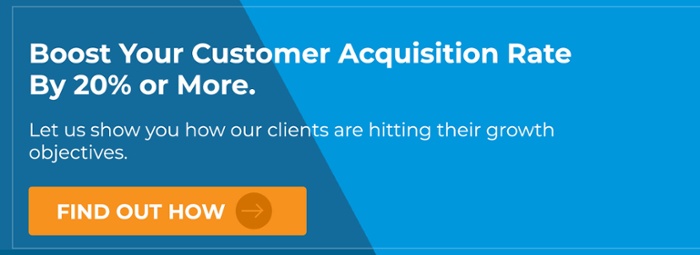
What Does Content Marketing Cost?
Patrick Dodge
Founder
There are literally thousands of agencies out there that are trying to sell content marketing services, each of them preaching the importance of communicating with people online, and yet, when you try to research what it costs to hire an agency, many of them are dead silent.
Why is that? I have a few ideas.
Content marketing is different from most other services agencies provide. If you want to advertise using Google Adwords, the process and fees are pretty straight forward. Need a retargeting campaign to hunt down the visitors who got away? There’s a standardized plan with your name on it.
But content marketing is an umbrella term. Every communication with customers that has a positive impact on your business without using overt sales messaging could potentially fall under this heading. Social media, newsletters, blogs, videos, books, whitepapers are just a few examples of what content marketing encompasses.
With so many different pieces making up a large puzzle, it’s no wonder the question of cost is so difficult to answer. I’m not going to waste space writing about setting goals and forming a strategy. You can read about that in thousands of posts. For our purposes here, I’m going to limit the discussion only to factors that impact the all-important bottom line.
Agency, Freelancer, or In-House?
You are literally surrounded by content marketers. Freelancers and agencies are out there, tossing blog articles online like ninja stars, all of them clambering for your business. You may also have talented people in-house who could fill gaps in your content strategy, like a social media team that keeps lively conversations with your customers. So how do you find the best direction for your company?
What's In Your Wallet?
Let’s get right to brass tacks. You have a budget in mind, and are wondering if it will be enough to produce good results. A content marketing strategy can build trust and help you earn new business, but can you afford to invest in a solution that delivers ROI?
Most businesses spend between 3 and 10 percent of their gross revenue on advertising, a figure that goes up or down based on size of the company, industry type, and market competition. Content marketing falls somewhere in the digital marketing mix, and how much you spend will depend on the services performed and who is doing the work.
The biggest factor that will influence cost is who you hire, and every option has pros and cons.
Hiring In-House
Hiring a full-time content strategist, or a team, is a productive investment since you will have dedicated employees who only work on your objectives.

Costs
Glassdoor cites that the average content manager makes $45,000 to $92,000 or more a year, with a national average of $65,371. Experienced content marketers with more than 5 years under their belts can draw salaries of more than $100,000 in some metro markets. Smaller markets usually pay less.
Advantages And Disadvantages
The downside is the time and money required for hiring the position, paying benefits, and onboarding. These positions are in high demand as well, so you may face employee turnover on a regular basis. You will also be limited by the skills and workload of the people you hire. It’s rare for a single employee to handle all aspects of a content marketing strategy and do it well. There is simply too much work involved, and one person cannot be an expert in everything. So, unless you can assemble a dream team of skilled specialists, you will likely have to make concessions on how your strategy is executed.
Hiring a Freelancer
Websites like Freelancer and Upwork have made it easier for companies to find qualified freelancers and outsource work to them. A quick search on either of those sites will turn up hundreds, if not thousands, of candidates who can help you with your content management needs.
Rates
The rates freelancers charge are all over the map. Less experienced marketers in the U.S. and Canada (and some people who work overseas) charge rates as low as $12 an hour. Most skilled and experienced marketers charge between $50 and $100 an hour.
Writers charge by the hour, word, or offer a fixed rate for the entire job. You could pay anywhere from $30 to $250 for blog posts, and between $500 and $3000 for long form content, like whitepapers and eBooks.
Advantages And Disadvantages
The advantages of hiring a freelancer are obvious. You won’t have to pay insurance or benefits; they are easy to hire and fire; and you will have a large selection of talent to choose from if you are okay with your contractors working from distant locations.
Despite these benefits, you may find it hard to maintain a consistent and quality output from freelancers. Every project is a temporary business arrangement, and your highest priorities will not always be theirs. Relationships that start off great sometimes unravel due to missed deadlines, poor communication, and rushed, shoddy work as your freelancer gets involved with other projects.
Hiring a Content Marketing Agency
Content marketing agencies come in all shapes and sizes, but most of them offer a standard mix of services that include the following:
Planning – Your agency should maintain a calendar that maps out your strategy over the course of months. This includes keyword research for optimization and topic selection based on questions your customers ask.
Creation – Most agencies concentrate on blogging as a primary service, although video marketing is now one of the most important investments a business can make in an ongoing strategy. Agencies also create micro-content for interacting with followers on social media, like memes, photography, live videos, and infographics. Long form content types include webinars, podcasts, whitepapers and eBooks.
Distribution – One of the most important and challenging aspects of content marketing is getting your material in front of the right people. The primary tools agencies rely on are SEO, social media, and email marketing, and platforms that not owned by your company are getting increasingly crowded, making it harder to reach audiences. This is why social media is evolving into paid media where you have to pay to get placement in newsfeeds.
Analytics – Most agencies offer some form of monthly reporting or analytics that show you key performance indicators. If your agency is using advanced marketing analytics like HubSpot, you will get great insight into how content marketing is putting dollars in your pocket. On the other hand, agencies that primarily rely on free metrics from Google Analytics will find it much harder to demonstrate ROI.
Inbound Marketing – Often confused with content marketing, inbound involves using automation and analytics to maintain a sales funnel with your campaign. It is the engine that turns visitors into leads, and leads into sales. HubSpot agency partners like ours not only manage the individual components of your content outreach, we also manage the customer acquisition pipeline using marketing automation, lead nurturing, and workflows.
Rates
Agencies base their rates on services provided (which impact overhead costs), as well as their size and expertise. New startups with a limited number of services might start on the lower end of the spectrum, offering packages that range from $1,000 to $2500. Higher-end agencies that offer inbound management services will offer monthly retainers that start at $3,000 and top out around $10,000.
Advantages And Disadvantages
The advantage of hiring an agency is that you will have a team of dedicated professionals who are true experts. They specialize in long-term partnerships that deliver lasting results, and you may even find one that specializes in your industry. An agency will also bring consistency and stability to your program, a goal much harder to achieve with freelancers.
There is a trade-off for this level of experience, of course. You will pay more than you would by using freelancers, but the increase in costs should be offset by a stronger ROI. An agency plan may also be more efficient than hiring your own staff, especially after factoring in the time and expenses related to recruiting, benefits, and training.
While cost is a major consideration with an investment like this, it’s important to set the stage for success. No matter which direction you go in, winning at content marketing depends on moving fast and getting stuff done. While it’s important to make sure your content is great, companies that spend weeks over-analyzing every detail always stifle progress and weaken results. Producing quality content is a must, but it’s a process that depends on learning and optimization as you go.
Making the decision to get started is half the battle. Once you do that, you are well on your way.
Oct 21, 2016 11:48:12 AM


